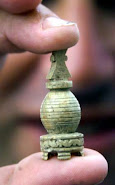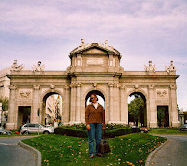 It's only going to get worse as the population continues to grow and the weather gets dryer and hotter in the regions already suffering from drought and lack of potable water. The implications of this article are truly frightening:
It's only going to get worse as the population continues to grow and the weather gets dryer and hotter in the regions already suffering from drought and lack of potable water. The implications of this article are truly frightening:From The New York Times
By ELISABETH ROSENTHAL
Published: June 3, 2008
FORTUNA, Spain — Lush fields of lettuce and hothouses of tomatoes line the roads. Verdant new developments of plush pastel vacation homes beckon buyers from Britain and Germany. Golf courses — dozens of them, all recently built — give way to the beach. At last, this hardscrabble corner of southeast Spain is thriving.
There is only one problem with the picture of bounty: this province, Murcia, is running out of water. Swaths of southeast Spain are steadily turning into desert, a process spurred on by global warming and poorly planned development.
Murcia, traditionally a poor farming region, has undergone a resort-building boom in recent years, even as many of its farmers have switched to more thirsty crops, encouraged by water transfer plans, which have become increasingly untenable. The combination has put new pressures on the land and its dwindling supply of water.
This year, farmers are fighting developers over water rights. They are fighting one another over who gets to water their crops. And in a sign of their mounting desperation, they are buying and selling water like gold on a rapidly growing black market, mostly from illegal wells.
Southern Spain has long been plagued by cyclical droughts, but the current crisis, scientists say, probably reflects a more permanent climate change brought on by global warming. And it is a harbinger of a new kind of conflict.
The battles of yesterday were fought over land, they warn. Those of the present center on oil. But those of the future — a future made hotter and drier by climate change in much of the world — seem likely to focus on water, they say.
“Water will be the environmental issue this year — the problem is urgent and immediate,” said Barbara Helferrich, a spokeswoman for the European Union’s Environment Directorate. “If you already have water shortages in spring, you know it’s going to be a really bad summer.”
Dozens of world leaders will be meeting at the United Nations Food and Agriculture Organization headquarters in Rome starting Tuesday to address a global food crisis caused in part by water shortages in Africa, Australia and here in southern Spain.
Climate change means that creeping deserts may eventually drive 135 million people off their land, the United Nations estimates. Most of them are in the developing world. But Southern Europe is experiencing the problem now, its climate drying to the point that it is becoming more like Africa’s, scientists say.
For Murcia, the arrival of the water crisis has been accelerated by developers and farmers who have hewed to water-hungry ventures highly unsuited to a drier, warmer climate: crops like lettuce that need ample irrigation, resorts that promise a swimming pool in the yard, acres of freshly sodded golf courses that sop up millions of gallons a day.
“I come under a lot of pressure to release water from farmers and also from developers,” said Antonio Pérez Gracia, the water manager here in Fortuna, sipping coffee with farmers in a bar in the town’s dusty square. He rued the fact that he could provide each property owner with only 30 percent of its government-determined water allotment.
“I’m not sure what we’ll do this summer,” he added, noting that the local aquifer was sinking so quickly that the pumps would not reach it soon. “I come under a lot of pressure to release water, from farmers and also from developers. They can complain as much as they want, but if there’s no more water, there’s no more water.”
Rubén Vives, a farmer who relies on Mr. Pérez Gracia’s largess, said he could not afford the black market water prices. “This year, my livelihood is in danger,” said Mr. Vives, who has farmed low-water crops like lemons here for nearly two decades.
The hundreds of thousands of wells — most of them illegal — that have in the past provided a temporary reprieve from thirst have depleted underground water to the point of no return. Water from northern Spain that was once transferred here has also slowed to a trickle, as wetter northern provinces are drying up, too.
The scramble for water has set off scandals. Local officials are in prison for taking payoffs to grant building permits in places where there is not adequate water. Chema Gil, a journalist who exposed one such scheme, has been subject to death threats, carries pepper spray and is guarded day and night by the Guardia Civil, a police force with military and civilian functions.
Rest of article.



































No comments:
Post a Comment